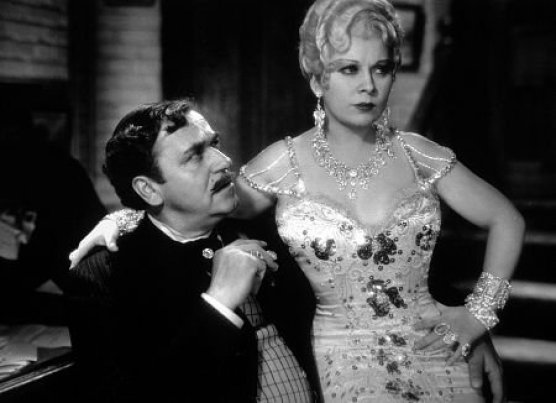Kino continues to outdo many of their competitors for high quality, reasonably priced Blu-ray releases of films that, dear God, really should be more widely available. This month, they set the bar high by releasing a number of Mae West’s comedies, ranging from the post-Code Every Day’s a Holiday to her most famous film, She Done Him Wrong, the movie that appropriately voices what we’d all like to say to a young Cary Grant.
She Done Him Wrong was a major box office success, nominated for an Academy Award for Outstanding Production (now known as Best Picture), and the film that solidified Mae West as a film star (it also saved Paramount from bankruptcy). It takes credit, perhaps wrongly, both for the launch of Cary Grant’s career and a major step towards the adoption of the Production Code, given its subject matters of prostitution, murder, and a sex positive woman who ogles all the men. Certainly, West’s few post-Code films never ascend to these heights.

West is Lady Lou, a singer in a club on the Bowery where she’s having an affair with the club owner, Gus (Noah Beery Sr.), and making eyes at the local city mission director Captain Cummings (Cary Grant). But she’s unaware that Gus is a sex trafficker and counterfeiter, working in cahoots with Rita (Raffaela Ottiano) and her boyfriend Sergei (Gilbert Roland). This comes to a head when Lou inadvertently sends a young woman, Sally, into their clutches, which in turn sets the police on her tail. Meanwhile, her ex-boyfriend Chick (Owen Moore), sent up the river for stealing diamonds for her, has plans to make a break for it and threatens to kill her if he discovers she’s been having affairs with other men. Despite the apparently heavy subjects, the film is a comedy, lightened at every turn by bawdy exchanges, high-camp songs, and West’s fantastically entertaining persona.
She Done Him Wrong is both sparse on details and heavy on plot—most of the machinations are more in the service of giving West scenes than with creating narrative tension on their own—but the melodrama and kinetic plot keeps things active while giving West ample space to ogle the men, make wisecracks, and occasionally remind us that a woman’s body is her own. West’s persona is always delightful—she never runs anywhere, swinging her hips and sashaying up the stairs even when threatened with arrest or murder. The film is punctuated with West’s one-liners—including her all-timer “Why don’t you come up some time and see me?”—and surprisingly explicit songs, such as a one about a jockey called “I Wonder Where My Easy Rider’s Gone.”
West’s moral universe is underrated, as discussions of her tend to focus more on sexuality and humor than what she actually does with it. Lou is not blameless—much of the film is about her learning the human price of diamonds, as she ignores or does not consider the provenance of her own wealth. Her diamonds cause robbery, murder, and rape, something that she fails to come to terms with until fairly late in the story. Violence against, in fact, is a major issue of the film. Chick threatens to kill Lou if she betrays him; Sergei and Gus sell Sally to the Barbary Coast; a man is the cause of a murder, and the cause of Sally’s destruction. Most of the male characters (with a notable exception) are unable to express their love without obsession and threats—they believe that they need only have more money than the other guy in order to own Lou. Lou herself comments on having to play by men’s rules, but she remarks that she enjoys the game—she understands that she’s a woman living in a man’s world and has learned to utilize her sexuality for her own desires and pleasure. She has a price, but it’s one that she sets.
Sexuality is not wrong but it is exploitable—Lou innocently sends Sally into danger because she fails to consider the reality of her own situation, and the reality of the men she interacts with. She has to learn that there are things more important than diamonds, but that doesn’t mean she’s wrong for wanting what she wants, whether it be sex, money, or love. And while Lou dismisses many of the more serious issues between men and women—“When women go wrong, men go right after them.”—there’s an underlying awareness of just how unsafe the world is for women, and how all women walk a fine line between pleasing men and being destroyed by them. Lou’s arc is not to be punished for her sexuality or even her voracious appetite for the good things, but to finally see the world as it is, and in the process to get her man. If all of West’s films are inherently sex positive, this one most explicitly sets her as a sex worker who dictates her own terms. She sizes up Cummings immediately, commenting, “You can be had,” a promise that she’ll get him in the end. Lou might live in man’s world because that’s the nature of the world, but she has carved out a space for herself in which no one can dictate what she does with her body. She sings what she wants, sleeps with whom she wants, and sets the price of her affections based on what she wants—from most men she wants diamonds, from others she wants good sex, and from one, she wants love.
It is a great thrill that She Done Him Wrong is now available properly restored on Kino Blu-ray. The disc also includes two commentaries by film historians, and a bonus cartoon “She Done Him Right,” which is just lovely. Coming in at a spare hour plus, She Done Him Wrong is entertaining, hilarious, and shocking in many ways—even in a Pre-Code world, what West got away with onscreen is nothing short of revolutionary.
She Done Him Wrong is available on Blu-ray from Kino Lorber.




Carol
I love this film and you nailed it!